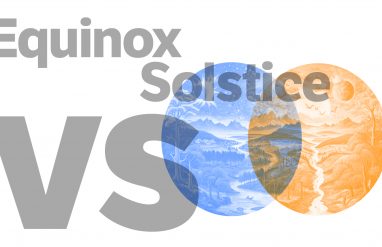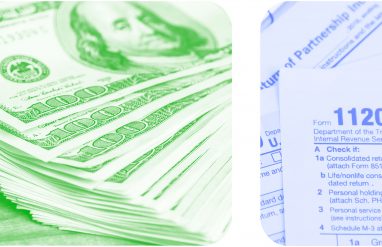WATCH: What Is The Difference Between "Weather" vs. "Climate"?
We love the earth, it’s beautiful, amazing … and it needs our help. The phrase Earth Day originated in 1969. It means “a day’s observance of the need to protect the Earth’s environment, in many countries on April 22.”
The first Earth Day was organized by Senator Gaylord Nelson of Wisconsin in 1970. He was upset that politics and media were not addressing the concerns of our environment. And, even though Earth Day has persisted since 1970, it seems that politics and the media still like to avoid the subject.
So, we at Dictionary.com are proud to bring you some words to remember on Earth Day (and really every day) to help our Earth out.
climate change
We’re starting out strong … so, is climate change a real thing? Most scientists believe so—here’s why. Climate change refers to a sweeping change in global climate conditions, including weather phenomena, temperature, and sea levels. It’s caused by an influx of greenhouse gases, mostly from fossil fuel emissions around the world. These gases trap heat in the atmosphere and change weather patterns, warming many areas of the globe and causing erratic season and weather events. Climate change is often used interchangeably with global warming but this use is subject to debate. Though global warming used to be the more popular expression among environmental scientists, climate change is now preferred because it encompasses effects beyond the rising temperatures around the globe. Global warming is often dismissed by climate change deniers, who erroneously point to cold spells as evidence against the very existence of climate change.
climate action
In the last 15 years, the term climate action has become a popular way to encourage and support efforts to mitigate climate change. Climate action is also goal no. 13 in the UN’s Sustainable Development Goals, or Global Goals. “Affordable, scalable solutions are now available to enable countries to leapfrog to cleaner, more resilient economies,” the report states. Action is needed at the international level “to help developing countries move toward a low-carbon economy.”
In 2019, 16-year-old Greta Thunberg took her message of climate action to the streets when she started a solo school strike. Her strike has grown to a worldwide movement inspiring millions to strike along with her.
you reap what you sow
This is an old proverb that’s pretty relevant to the Earth on Earth Day. It means future consequences are inevitably shaped by present actions (cough, cough everybody). It’s originally from the Bible, but you reap what sow is used in many other contexts, as well, from elevated religious and political discourse to pop culture and everyday speech.
In a 1965 speech, Martin Luther King Jr. memorably asked how long it would be until we could achieve justice and racial equality. Near the close of the speech, King asked, “How long? Not long,” because “you shall reap what you sow,” indicating that nonviolent protest would eventually be rewarded. MLK used it—so should we.
In everyday speech, you reap what you sow is sometimes used after the fact, to indicate that someone should have expected the results that followed from their actions. In this use, it’s similar to I told you so. You reap what you sow has also been used to describe the Hindu and Buddhist concept of karma to westerners.
So, all in all, it’s one to remember when you see a plastic bottle in the trash bin instead of recycling (karma, people) … or when someone claims global warming is a myth. We don’t want to say we told you so.
snowclone
Nope, not a snow cone … a snowclone is a customizable formulaic phrase that consists of a framework that can be adapted for different situations by changing some of the words. And, you thought it was a fun snow word. Sorry. However, the inspiration was the oft-quoted but incorrect piece of trivia that Eskimos have a large number of words for snow. Phrases that went, roughly, “if Eskimos have N words for snow, then surely X have Y words for Z” were therefore clones of the original snow quote.
So, a snowclone typically takes the shape of X is the new Y. Why do you need to know this for Earth Day? It’s a handy one to whip out when defending our dear environment … e.g., TWD is the new reality (if you don’t start taking care of the environment). Just kidding—we think.
FWP
First World Problems or fwps are issues that are only seen as such by people in wealthy parts of the world. The term is generally used in a tongue-in-cheek way online by people in wealthy nations to poke fun at themselves.
The phrase itself is not without controversy. Critics such as Alexis C. Madrigal for The Atlantic and Steven Poole for The Guardian have argued that First World Problems is problematic, racist, and condescending. Poole writes that the phrase implies that “third world” nations (now commonly referred to as “developing nations”) are homogenous in their worries, and that “hunger, disease, and war are not only prevalent among the global poor but in some way the sole conditions of their lives.”
Why’s it on this list? There’s a real chance here to change the controversy surrounding FWP and make it something valuable … i.e., it’s a first world problem to figure out how to save the Earth from pollution, resource depletion, warming. Go!
red pill
Anyone remember The Matrix? We do! And, the red pill was the one Neo’s offered that will show him the truth about the world—it may be the hard truth but at least he’ll know, right? Often times, it seems easier to take the blue pill, the one that hides the scary truths and leaves us in a bubble of comfort and security. But, when it comes to Earth Day and our environment, take the red pill so that we can keep this planet thriving for generations and generations to come.
tipping point
In its 2014 report on climate change, the United Nations Intergovernmental Panel on Climate Change defined tipping point as “irreversible change in the climate system.” As temperatures continue to rise, societies are at an increased risk of crossing a point of no return regarding damage to the environment. For example, if Greenhouse and Antarctic ice sheets melt, the ice cannot be regained; this is an irreversible tipping point that would affect the entire globe.
Recent research shows that change may come in bursts, and as Earth moves past each tipping point, climate change may start a “cascade” of negative consequences. Authors in the journal Nature identified some of these tipping points as: “runaway loss of ice sheets that accelerate sea level rise; forests and other natural carbon stores such as permafrost releasing those stores into the atmosphere as carbon dioxide (CO2), accelerating warming; and the disabling of the ocean circulation system.”
concern troll
Don’t be swayed by a concern troll when you’re trying to learn more about climate change and environmental issues online. They’re out there, and they’re hiding under the guise of concern in order to try and sway you into believing something contrary to the cause. Concern trolling involves someone opposing an idea or viewpoint, yet acting like they’re an advocate for the cause. A concern troll offers undermining criticisms. Their goal is to sabotage the cause being discussed and to inspire doubt among group members. This occurs in groups rallied around a particular issue, especially in political parties, and the goal of concern trolling is to cause dissent within a community.
Green New Deal
The Green New Deal (GND) is a first-of-its-kind plan to fight climate change introduced by Senator Ed Markey (D-MA) and Representative Alexandria Ocasio-Cortez (D-NY) in February 2019. Essentially, it’s a program of investments into clean-energy jobs and infrastructure, with the aim of decarbonizing—another climate change term we’re keeping our eye on—the economy by shifting away from fossil fuels.
The plan takes its name from Franklin Delano Roosevelt’s New Deal in the 1930s, which was a series of programs and economic reforms to provide relief from the Great Depression. Green, here, refers to something “environmentally sound or beneficial.” (Learn more about its name here.)
Details of the GND are still in flux, but they reportedly include proposals to build high-speed train lines, invest in zero-emission vehicles, and generate 100 percent of electricity from zero-emission sources. Zero-emission means “emitting no harmful pollutants,” another important term in our expanding language of climate change.
double rainbow
OK, we’re ending with a positive one. Remember that guy who freaked out over the double rainbow? He’s the best. And, now the phrase double rainbow tends to specifically reference that guy’s innocent and joyous reaction to one of Earth’s prettiest creations: the double rainbow.
Just remember how amazing and inspiring Earth itself can be, and if you want to share those feelings, use the phrase double rainbow.
Want to know some other environmental words? Check out these amazing weather words.














